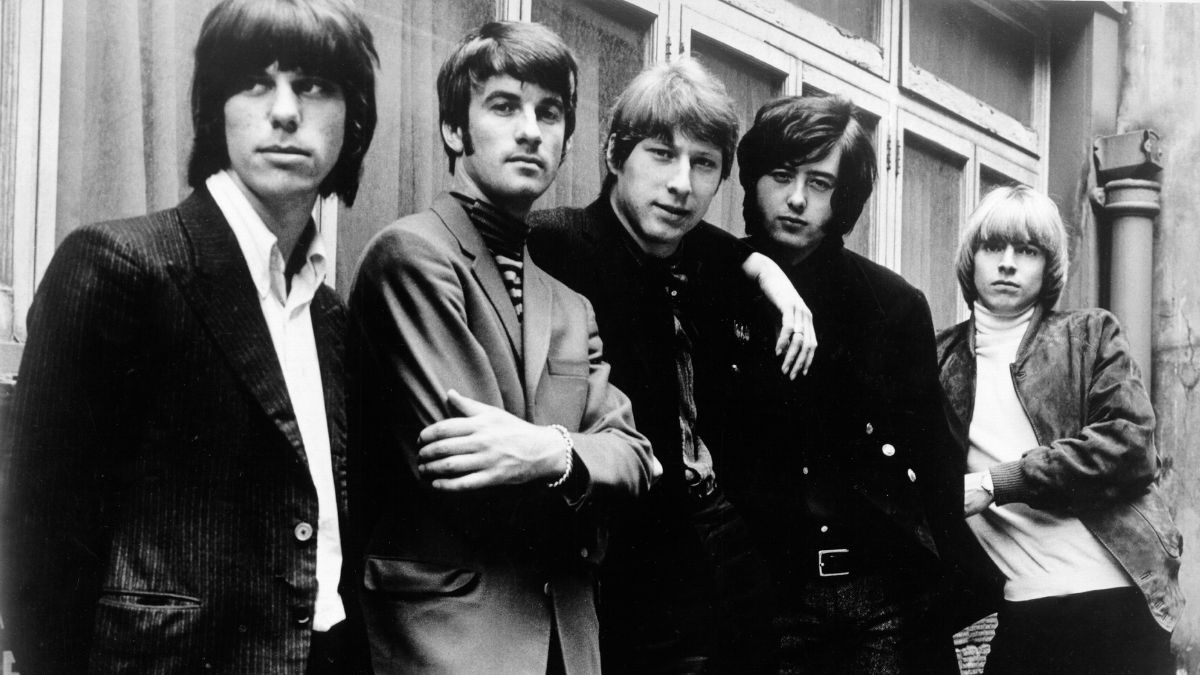“Even though he says he wrote it, I wrote it!" Jeff Beck and Jimmy Page never agreed on which of them composed the song Beck called “the first heavy metal riff ever written"
The tune's 1966 recording session would lead to the formation of Led Zeppelin two years later

Jeff Beck and Jimmy Page had been close friends ever since they met in their teens. It was Page who recommended Beck as Eric Clapton's replacement in the Yardbirds in 1965, after Clapton flew the nest to join John Mayall’s Bluesbreakers. Beck and Page would even work together in the Yardbirds for a brief period, before the former departed and began to build his solo career.
Despite being as close as brothers, the two never saw eye to eye on one thing: who should get writing credit for "Beck's Bolero," the 1966 instrumental featuring Beck, Page, Who drummer Keith Moon, keyboardist Nicky Hopkins and future Led Zeppelin bassist John Paul Jones. .
Beck's decision to create a group was inspired in part by the guitarist he replaced in the Yardbirds — Eric Clapton. Following his brief spell with the Bluesbreakers, Clapton departed in mid 1966 to form the supergroup, Cream.
Although Beck was invited to take Clapton's place in the Bluesbreakers, he opted instead to follow the guitarist's lead and form his own supergroup, doing so just days after Cream was formed.
With Page's help, Beck put together his ad hoc group to record “Beck’s Bolero,” a riff-driven instrumental inspired by French composer Maurice Ravel's 1928 orchestral piece, Boléro. The final result was considerably heavier than Ravel's, thanks to the pair’s electric guitar talents — featuring Page slashing away at the chords on a Fender Electric XII 12-string — and proto-heavy metal panache.
In the years after, Beck would say of "Beck's Bolero" featured “the first heavy metal riff ever written,” and I wrote it.”
Page disagreed and said so in his 1977 cover story with Guitar Player.
All the latest guitar news, interviews, lessons, reviews, deals and more, direct to your inbox!
“Even though he says he wrote it, I wrote it," the guitarist insisted. "I’m playing the 12-string on it. Beck’s doing the slide bits, and I’m basically playing around the chords.”
“It’s got a lot of drama to it,” Page added. “It came off right. It was a good lineup too, with Keith Moon and everything.”
Of course, Page has been involved in other, more famous disputes over songwriting credits. In 2020, he won a long-running lawsuit alleging his famous 1971 Led Zeppelin track "Stairway to Heaven" infringed on the copyright of the 1968 instrumental "Taurus," composed by Randy California and recorded by his band Spirit. This past May he faced a fresh lawsuit over "Dazed and Confused" from its songwriter, Jake Holmes.
However, he handily won authorship of "Beck's Bolero" without litigation, much to Beck's dismay. Although he believed he had changed Page's core ideas enough to earn at least a co-writing credit, Beck stepped aside and let Page take the honors.
“No, I didn’t get a songwriting credit,” the guitarist conceded, “but you win some and lose some down the years.”
He was likewise unlucky with the formation of his supergroup. Despite the promising results of "Beck's Bolero," the band never gelled.
“I don’t know if it would have worked or not, but it sounded so great in the studio,” Beck later pondered (via Far Out). “I couldn’t believe it when we went back and listened to it in the control room. We were going: ‘This is amazing. What can we do with it?’

“You can hear Moon screaming in the middle of the record over the drum break. If you listen, you can only hear the cymbal afterwards 'cause he knocked the mic over.”
Ultimately, the band disintegrated once recording wrapped.
“The next thing we know, Keith is back with the Who, and the whole thing never got off the ground,” Beck sighed. “But all we needed was a singer.”
There were even disputes over the production credits, perhaps given the song's success when it was eventually released. During his GP chat, Page said producer Simon Napier-Bell ghosted the band during its recording.
“The producer just disappeared,” he said. “He was never seen again; he simply didn’t come back. He just sort of left me and Jeff to it.”
Conversely, Mickie Most, who Beck later employed for his debut solo album Truth and 1969 follow-up, Beck-Ola, claimed he was the man behind the desk.
It was the only amp I had, and it was covered with beer! Actually, I think it was the beer that gave it its sound!”
— Jeff Beck
"Beck's Bolero" wouldn't see the light of day for another year, when it became the B-side to Beck's U.K. debut solo single, "Hi Ho Silver Lining." The guitarist handled the bulk of the vocals, with Rod Stewart, who would go on to front the Jeff Beck Group, providing backing vocals. When John Paul Jones left to form Led Zeppelin with Page, Ronnie Wood took his place, and Beck finally got his supergroup of sorts.
“I was using a Les Paul for the lead guitar and for the backwards slide guitar through a Vox AC30,” Beck says of his gear on the track. “It was the only amp I had, and it was covered with beer! Actually, I think it was the beer that gave it its sound!”
A freelance writer with a penchant for music that gets weird, Phil is a regular contributor to Prog, Guitar World, and Total Guitar magazines and is especially keen on shining a light on unknown artists. Outside of the journalism realm, you can find him writing angular riffs in progressive metal band, Prognosis, in which he slings an 8-string Strandberg Boden Original, churning that low string through a variety of tunings. He's also a published author and is currently penning his debut novel which chucks fantasy, mythology and humanity into a great big melting pot.


